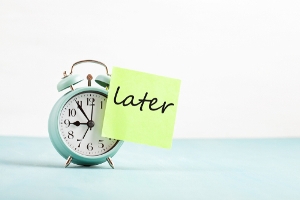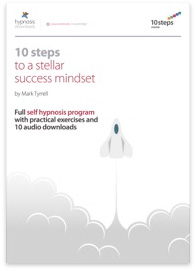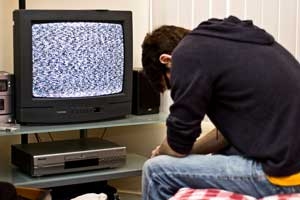How to Stop Procrastinating
7 tips to get on with it... now!

Jane looked like a desperate fugitive on the run from coursework completion. Dark under-eye circles, pale, energy utterly drained - and that was just me after listening to her for a whole hour. Not that she wasn't nice, she was. It's just that hearing reasons why people haven't been doing what they should have been always has this effect on me.
She had two weeks to complete her degree dissertation. The culmination of three years of study, the key to her chosen career - and was she getting down to it? No. As she told me bitterly of her endless procrastinating: "I'm a rabbit caught in headlamps!"
"Not literally!" I reminded her pedantically.
But, granted, that's what procrastination feels like. The intention is there but the action isn't. "Inactivity is the grave of good intentions," as I think someone once got around to saying.
Indeed, Jane was a professional procrastinator. "I work hard at not working. I have upped my social life, started singing lessons, found new TV shows to watch. I'm spending more time tending my garden. I'm doing everything but what I should be doing." Not doing stuff is full-time work! "I know what will happen! I'll get to the point where not doing it will feel much worse than the thought of doing it, then I'll cram it into the last couple of days. I'll do okay, but it won't be anywhere near as good as it could be!"
"Mark, why do I procrastinate?" Good question.
Well, why do we procrastinate?
Don't rush me; I'm getting there! Well, 'conditioned rebellion' plays a part. As kids we're told what to do:
"Get to bed now!" I don't want to!
"Do your homework!" I don't want to!
"Finish your food!" No!
We can become used to feeling reluctant when it comes to stuff we have to do.
This automatic 'rebellion' can slide into adulthood. Sure, Jane had chosen to do her degree, but she still felt as if she 'had to do it'. I always loved reading but at school, I would not read novels on the English curriculum ('on principle'), only ones I'd chosen.
Procrastination isn't just about laziness. We all want to control stuff in our lives, and procrastinating can be an unconscious attempt to do things (or not) on our own terms. But it doesn't work, because procrastination leaves us feeling less in control.
I used to procrastinate; now I don't. These tips worked for me and many others, but you don't have to use them.
1) Stop leaking your motivation juice everywhere
I knew this guy Steve. Everyone was impressed with him...for a while. He'd wax lyrical (in the pub) how he was going to write a great novel, make a documentary, cut a record. The problem was, by the time it came to actually begin his next great project, he had no motivation left. He'd already been 'paid'. He'd received positive attention, approval, a sense of fake achievement already - to the extent that true motivation (to begin and complete the project for its own sake) had leaked away. He'd greedily consumed glory for stuff he hadn't done yet just through talking. So why actually do it?
Then he'd go quiet. Not letting him off the hook, I'd ask him cheerily how the novel/planned expedition to the North Pole/new school for dyslexic lap dancers was coming along. Excuses, factors outside of his control, of course. Then, on to the next great thing; people stopped listening.
The fact is that:
- Writers write.
- Athletes train.
- Musicians play.
- Fundraisers raise funds.
- Business builders build business.
Talking too much about what you are going to do (or should be doing) leaks energy. Lock the energy away and save it for actions; don't squander it on empty talk. Then surprise people later with what you've done.
Are you genuine or fake?
2) Stop waiting for the magic 'now I feel like doing it' moment
Waiting to feel like doing something before starting it is a disaster. It might be okay for young children, but only being interested in an experience if it's 'sugar-coated' with instant positive gratification leads to a life of mediocrity and non-achievement.
We've all been, perhaps, a little conned by the cultural idea that: 'if something doesn't feel good then don't do it!' But we don't learn to enjoy, say, exercise unless we get used to exercising without enjoyment. Tiredness, distractions, emotional reluctance need to be ignored, seen as irrelevant, if we are to build willpower.
And the 'pay off' from doing this is huge because as recent research has shown, the more we use willpower the more we can grow it - just like a muscle (1).
Jane had been waiting to feel like working on her dissertation. I asked her to stop thinking about whether she felt like doing it and just do it. Too much self-analysis can lead to paralysis of action.
3) Be honest... with yourself too
My friend down the pub wasn't honest. He thought he was. He'd make up reasons as to why things never seemed to work out. Jane at least was honest. She knew she was procrastinating, she knew that without my help she wouldn't get down to business until it was (almost) too late. Jane was closer to overcoming procrastination than Steve. At least she knew what she was doing so she had a chance to deal with it.
Had I said to Steve: "Do you want help with your habit of all talk and no action?", he would have denied it was even a problem.
Look at yourself: Do your actions match your words? If you have to be a kidder, at least don't kid yourself. Honesty is essential for my next tip, too.
4) Ditch the displacement activities
Doing things to avoid doing other things is (according to official psychobabble) known as 'displacement'. Well, technically displacement happens when you don't consciously know that you're doing one thing to avoid doing another. But let's use the term anyway.
I need to write an essay; I don't really want to do that, so I paint the kitchen. If I'd been told to paint the kitchen, I might have displaced that activity by writing my article! I might convince myself that the alternative activity really did need doing urgently.
But procrastination displacement is deeply unsatisfying, as Jane said: "If I watch a movie instead of working, I don't even enjoy that movie because what I should be doing is just hanging over me!"
Procrastination thrives on displacement. And when you procrastinate, it feels uncomfortable. Focus on how you'll feel later if you don't do what you need to do. Let that discomfort drive you to relieve it by doing what you need to do. There's a kind of purity to doing what you should that you just never get when you pursue displacement activities.
5) Just say no
"Come on, you can do that later. Come and have a drink. You'd be the only one not going."
No! Set boundaries: with others and with yourself. Say: "I'm sorry. I'm not going to the game, film, meal. I need to get this finished..." TV, random internet surfing, chatting with friends should be rewards for, not alternatives to, getting on with what needs to be done. Decide when you're going to work and tell yourself and others: "This is absolutely non-negotiable." Protect your project from those who would derail it. It needs to be nurtured and sheltered from anything that might 'kill it'.
Imagine entering a race you want to win. You crouch into the starting blocks, the crowd goes silent. This is your moment. The starting pistol cracks and...you put the kettle on and go watch daytime TV.
No, be strict with yourself and tell others that if they respect you, or like you even a little bit, they'll let you work.
6) Monkey does what monkey sees (in its head)
You're peckish. A beautiful snack is waiting for you in the fridge (it's mind-bogglingly healthy, of course) - you can see it sitting there waiting for you, you can smell it, feel it. Do you procrastinate? Put off going to the fridge, go file reports instead? No, you rush to the fridge slobbering like a St. Bernard pup. What you strongly imagine doing before you do it becomes compelling. Okay, eating a favourite snack might be more attractive then getting down to business anyway, but the fact remains that visualizing yourself getting on with it will make it harder for you not to (2).
Sit down, close your eyes, and imagine watching yourself (perhaps on a TV screen) absolutely focussed, working 'in the zone' until what you have to do is completed. Doing this will make it feel 'more right' to make a start...now.
7) Sign a declaration of independence (from procrastination)
More research (3) suggests that signing a letter of intent in front of witnesses makes it much more compelling to honour your intent. Write up or print out a letter of intent in the presence of trusted friends or colleagues. Tell them that when you've completed your task on a certain date, you'll 'sign off' in front of them. This may sound a little insane, but can be incredibly compelling.
Jane wanted to make another appointment. I told her she wouldn't need to and could use that hour and a half doing what she needed to do (I didn't want to be her displacement activity). She called me the next day: "Last night, I got back into my dissertation; I worked for seven solid hours! It's like I've fallen back in love with my subject again."
I did see her again several months later, as she wanted to quit: "Not only have I stopped procrastinating over work, I've stopped putting off deciding to quit smoking, too."
When you stop procrastinating, you'll find that the ripple benefits will spread far and wide.
10 Steps to a Stellar Success Mindset course
Let hypnosis drive success habits deep into your unconscious mind...
References
- Research by Richard Davidson, the director of the Laboratory for Affective Neuroscience at the University of Wisconsin, found that the left prefrontal cortex - the brain's executive centre located just behind the forehead - is a key site for helping us build willpower. The more we use it, the more we grow our willpower.
- An Ohio State University study found that people were more likely to vote in the 2004 presidential election after visualizing themselves voting from the perspective of an outside observer. In a study conducted online the night before the 2004 election, 146 Ohio State University undergraduates were told to imagine themselves voting from one of two perspectives. Some saw themselves as a third party would - as if they were watching a movie of themselves going to the polls. Others were told to use a first-person perspective - as if they were experiencing voting through their own eyes. The study found that 90 percent of those who had visualized themselves from an outsider's perspective reported voting, while only 72 percent of those who imagined voting from a first-person perspective did. Additionally, those who used the third-person perspective reported feeling more strongly about the importance of voting. The results were similar among George W. Bush and John Kerry supporters.
- Research cited in Cialdini's book Influence shows people are much more likely to stop smoking if they sign in front of others.







